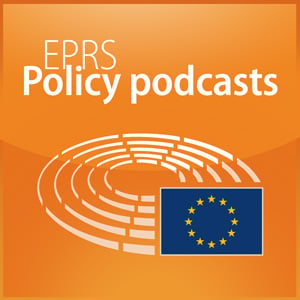Future shocks 2023: De-risking Europe's global critical supply chains
European Parliament - EPRS Policy podcasts
European Parliament Webmaster
4.8 • 13 Ratings
🗓️ 29 September 2023
⏱️ 8 minutes
🧾️ Download transcript
Summary
- Original publication on the EP Think Tank website
- Subscription to our RSS feed in case your have your own RSS reader
- Podcast available on Deezer, iTunes, TuneIn, Stitcher, YouTube
Source: © European Union - EP
Transcript
Click on a timestamp to play from that location
| 0:00.0 | Welcome to the European Parliamentary Research Service podcasts. |
| 0:05.4 | In this podcast, we'll talk about de-risking Europe's global critical supply chains, |
| 0:10.5 | one of the 15 risks identified and analysed by the EPRS in the Future Shocks 2030 report. |
| 0:18.2 | Want to know more? Stay with us. |
| 0:21.9 | Supply chains are entangled webs of companies, resources, activities and technologies involved |
| 0:27.9 | in the production and delivery of goods. Today's global economy relies on such chains and the |
| 0:34.2 | EU even more than the US and China. |
| 0:42.2 | Now, to understand how wide and complex these chains are, |
| 0:49.4 | just consider that a global car manufacturer can have more than 18,000 suppliers involved in its production process. |
| 1:04.7 | And disruptions at one point in the chain, due to natural disasters, wars, terrorist attacks or cyber attacks can have huge global repercussions, as we saw during COVID-19 or in the more recent context of Russia's war on Ukraine. |
| 1:12.6 | So the hardening geopolitical environment, the rise of protectionism and the pandemic triggered a debate on decoupling vulnerable supply chains in order to increase their resilience and reduce |
| 1:17.8 | dependencies on foreign suppliers such as China, which currently supplies the EU with all |
| 1:24.0 | the heavy rare earth elements it needs to produce electric motors or wind turbines. |
| 1:29.3 | Key technologies for the EU's green transition. |
| 1:33.3 | So while more strategic autonomy in this field is necessary, |
| 1:37.3 | the EU knows that full decoupling from China is neither possible nor desirable. |
| 1:43.3 | So the tone of the debate has shifted towards derisking. |
| 1:46.8 | Now, what does it actually mean? |
| 1:48.7 | De-risking is a more nuanced way of ensuring Europe's resilience and strategic autonomy when it comes to supply chains. |
| 1:56.1 | It can be achieved by increasing domestic production, ensuring greater autonomy in critical raw materials |
| 2:02.4 | through trade tools and global cooperation. |
| 2:06.1 | The European Parliament has long been proposing a holistic way to address supply chain risks |
... |
Please login to see the full transcript.
Disclaimer: The podcast and artwork embedded on this page are from European Parliament Webmaster, and are the property of its owner and not affiliated with or endorsed by Tapesearch.
Generated transcripts are the property of European Parliament Webmaster and are distributed freely under the Fair Use doctrine. Transcripts generated by Tapesearch are not guaranteed to be accurate.
Copyright © Tapesearch 2025.

